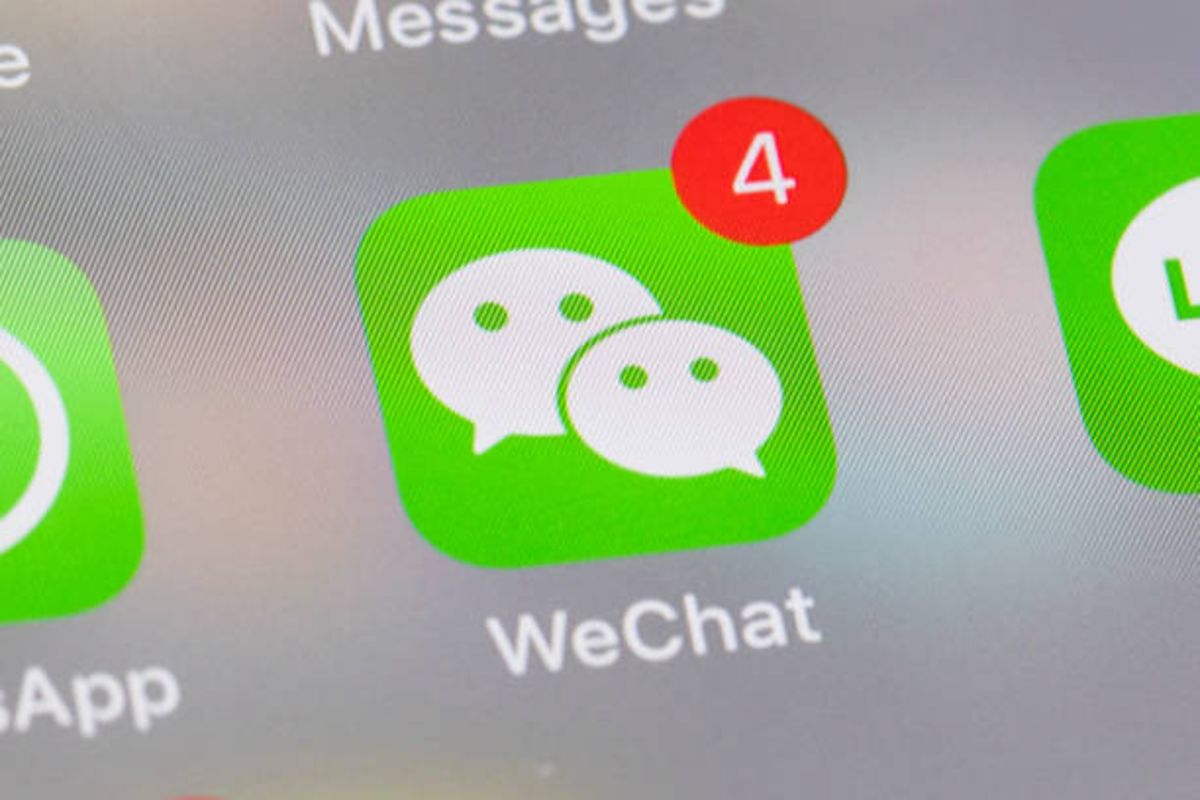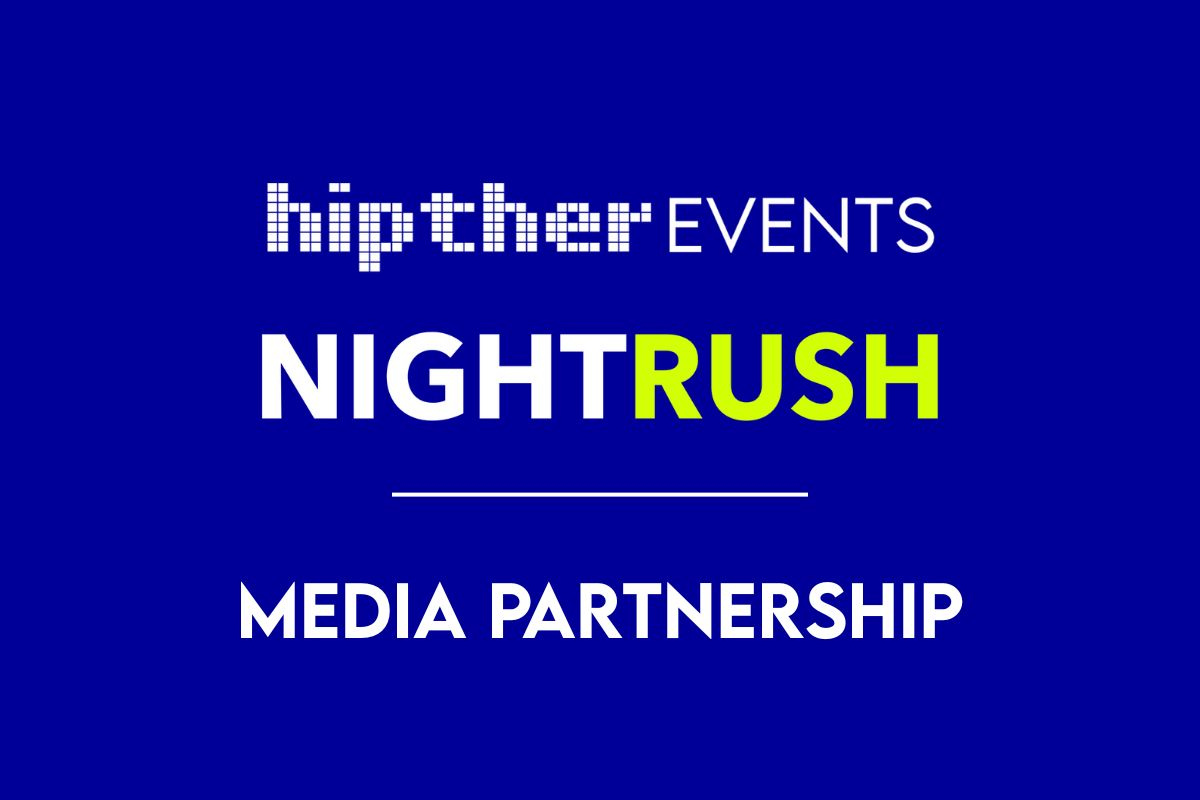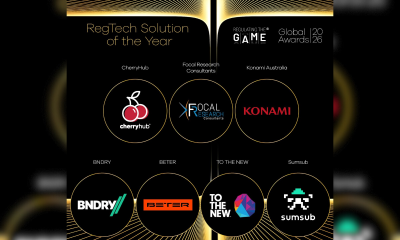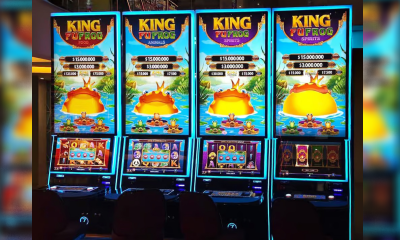Latest News
WeChat is World’s Strongest Tech Brand

As the pandemic continues to wreak havoc on the global economy, tech brands have recorded mixed fortunes this year. The top 100 most valuable tech brands in the Brand Finance Tech 100 2021 ranking have grown by 9% on average, faring much better than other sectors globally.
The Brand Finance Tech 100 2021 ranking is split into sub sectors, with electronics, retail, semiconductors, software, media & games, travel sites analysed separately as these brands make up more than 80% of the total brand value in the ranking. All brand values are correct as at 1st January 2021.
Electronics: Apple bites back
Apple has overtaken Amazon and Google to reclaim the title of the world’s most valuable tech brand, according to the latest report by Brand Finance – the world’s leading brand valuation consultancy. Apple has the success of its diversification strategy to thank for an impressive 87% brand value increase to US$263.4 billion and its position at the top of the ranking. For the fist time since 2016, Apple has also been crowned the world’s most valuable brand, according to the Brand Finance Global 500 2021 ranking.
Under Tim Cook’s leadership, especially over the past five years, Apple began to focus on developing its growth strategies above and beyond the iPhone – which in 2020 accounted for half of sales versus two-thirds in 2015. The diversification policy has seen the brand expand into digital and subscription services, including the App Store, iCloud, Apple Podcasts, Apple Music, Apple TV, and Apple Arcade. On New Year’s Day alone, App Store customers spent US$540 million on digital goods and services.
Apple’s transformation and ability to reinvent itself time and time again is setting it apart from other hardware makers and has contributed to the brand becoming the first US company to reach a US$2 trillion market cap in August 2020. With rumours resurfacing that Apple’s hotly anticipated Titan electric vehicle foray is underway again, it seems that there is no limit to what the brand can turn its hand to.
Lorenzo Coruzzi, Associate, Brand Finance commented:
“Apple has successfully reinvented its capabilities, while remaining faithful to its core: enriching people’s life through innovative design. Under Tim Cook’s leadership, it has been successfully diversifying its revenue mix shifting towards more profitable segments – showcasing that it is truly resilient against its competitors.”
Retail: Alibaba.com up 108%
Despite relinquishing its position at the top to Apple, second-ranked Amazon has still managed to record a healthy 15% brand value growth to US$254.2 billion and is the second most valuable tech brand. The retail giant is one of the few brands that benefitted considerably from the pandemic and the resulting unprecedented surge in demand as consumers turned online following store closures. Over Q2 and Q3 of 2020, e-commerce platforms experienced the highest revenue growth since 2016.
Most recently – further leveraging the circumstances of the pandemic – Amazon has acquired 11 passenger planes from struggling North American airlines to expand its air logistics capabilities. A tactical purchase to support its fast-growing customer base, but also a strategic move towards building its own end-to-end supply chain, the fleet can allow the brand to become a serious contender in air transportation in due time.
Another example of Amazon’s relentless innovation in the face of global adversity, the brand has also announced its foray into the health sector with the launch of Amazon Pharmacy and fitness tracker Halo. Before it brought success to Apple, daring diversification had already been the hallmark of Amazon’s growth strategy, which it continues to pursue with impressive results.
Amazon’s Chinese equivalent, Alibaba.com has also benefitted from the unprecedented surge in demand, as consumers in China turned to online shopping during the pandemic. The retail giant’s brand value has been boosted by an eyewatering 108% to US$39.2 billion, making it the fastest growing brand in the ranking. Alibaba subsidiaries, Taobao, up 44% to US$53.3 billion, and Tmall, up 60% to US$49.2 billion, have enjoyed parallel successes, their online business models providing ease of access and convenience for consumers.
Semiconductors: Nvidia acquisition of Arm pays off
As artificial intelligence, data centres, 5G technology, IoT, and autonomous vehicles are rapidly growing, semiconductor brands are perfectly positioned to match this growth as this demand requires a new era of sensors, memory, and chips. On average, semiconductor brands have grown 16%, of these Nvidia is the fastest growing, up 73% to US$8.1 billion.
Nvidia’s announcement of the US$40 billion deal to acquire Arm – British chip designer company – has caused quite a stir across the industry as Nvidia sets its sights on becoming the top player for the next generation of processing and AI.
The most valuable semiconductor brand by a significant margin, Intel, has increased its brand value by 16% this year to US$31.8 billion. From its next-generation chips being set back due to delays in sales of its current-generation chips, to Apple making the move to make its own computer chips, Intel has negotiated a turbulent year. Perhaps in a move to remain relevant, Intel has undergone a rebranding, introduced as part of the brand’s effort to be more aspirational and reflect the goals ahead.
Lorenzo Coruzzi, Associate, Brand Finance commented:
“Intel has been the largest chipmaker for most of the past 30 years, combining the best designs with cutting-edge factories. While the decision to outsource chip manufacturing has not yet officially been taken, long delays in production and design have been hindering the brand in recent years, placing it in a tricky position against competitor TMSC and other players. Outsourcing would mean giving up Intel’s historical competitive advantage and might have deep geopolitical consequences in the years ahead. With the arrival of the new CEO, Pat Gelsinger, in February it will soon be clearer the direction the company begins to take.”
Software: WFH boosts brands
Video conferencing and business communication software has taken centre stage as the working from home revolution takes hold globally. Salesforce’s (brand value up 29% to US$ 13.2 billion) acquisition of Slack is a clear signal that the brand wants to become more competitive in the space, especially against leader Microsoft (up 20% to US$140.4 billion). It will remain to be seen whether this platform integration will be effective and deliver the expected value.
Google is the most valuable software brand and sits in the third in the complete tech ranking, following a marginal 1% uplift in brand value to US$191.2 billion. Slightly behind its peers in terms of diversification, Google recorded its first ever revenue decline as a result of the pandemic. The vast majority of the brand’s revenue comes from advertising, which took a hit over the last year as marketing budgets tightened.
Media & Games: WeChat is sector’s & world’s strongest
Brand Finance determines the relative strength of brands through a balanced scorecard of metrics evaluating marketing investment, stakeholder equity, and business performance. According to these criteria, WeChat is the strongest tech brand – and the world’s strongest brand – with a Brand Strength Index (BSI) score of 95.4 out of 100 and a corresponding elite AAA+ brand strength rating.
Alongside revenue forecasts, brand strength is a crucial driver of brand value. As WeChat’s brand strength grew, its brand value also enjoyed a rapid boost, increasing by 25% to US$67.9 billion.
As one of China’s home-grown tech successes with very strong equity, WeChat enjoyed high scores in reputation and consideration among Chinese consumers. WeChat has successfully implemented a broad and all-encompassing proposition, that offers services from messaging and banking, to taxi services and online shopping – the all-in-one app has become essential to many users’ daily lives.
During the pandemic, WeChat ran several government-mandated health code apps to keep track of those travelling or in quarantine, providing access to real-time data on COVID-19, online consultations, and self-diagnoses services powered by artificial intelligence to over 300 million users.
The media landscape continues to evolve with traditional media outlets falling victim to their modern counterparts. In line with positive trends in brand value in the new media sector, Spotify has climbed 15 spots in the ranking from 80th to 65th, enjoying an impressive 39% boost in brand value to US$5.6 billion. The last year has seen a significant increase in new users as the music streaming platform expanded its operations into 13 new markets. Spotify is primed for further success as it continues to develop its capabilities, signing exclusive podcast contracts with Archie Comics and Joe Rogan, and acquiring Megaphone from Graham Holdings to improve its own podcast technology.
In contrast, Twitter has recorded a 18% brand value drop to US$3.1 billion. The social media platform’s actions have come under intense scrutiny as the handling of former President Trump’s account has sparked raucous debate, surrounding freedom of speech versus Trump’s use of the platform to incite violence, and spread false claims.
Lorenzo Coruzzi, Associate, Brand Finance commented:
“Podcasts are one of the key reasons why consumers move to premium subscription on music streaming services. The global podcast market size was expected to reach US$11.1 billion in 2020 and is expected to grow by nearly 30% by 2027. With these predictions, and competitors already demonstrating their intent in the market, it won’t be easy for Spotify to retain the crown of music streaming brand”.
Travel sites: victims of COVID-19
As holidays are cancelled and people are instructed to work from home, the hospitality sector has reached an almost complete standstill both from tourism, as well as corporate travel. Online booking platforms are crashing too. Booking.com has recorded a 19% brand value loss to US$8.3 billion, simultaneously dropping 10 positions in the ranking from 32nd to 42nd. The story is similar for Airbnb as 30% of its brand value eroded to US$3.4 billion.
Expedia has dropped out of the ranking this year, following a 25% brand value decrease.
Powered by WPeMatico
HIPTHER
HIPTHER Announces Media Partnership with Nightrush Ahead of Prague Summit 2026

HIPTHER is proud to announce a new Media Partnership with Nightrush, officially launching alongside the highly anticipated HIPTHER Prague Summit 2026. The event will take place on 24–25 March 2026 at the OREA Hotel Andels Praha, bringing together leading voices from across Gaming and Technology.
Recognised as one of Europe’s premier boutique events for industry decision-makers, the Prague Summit unites professionals from iGaming, fintech, blockchain, AI, compliance, and digital innovation. Across two immersive days, attendees will engage in expert-led discussions, curated networking opportunities, and hands-on learning experiences designed to address the most pressing challenges and opportunities shaping regulated digital industries.
This new collaboration marks an important step in expanding industry dialogue and strengthening global connections within the iGaming ecosystem.
Strengthening Industry Connections Through Media Collaboration
Nightrush has rapidly established itself as a trusted media platform dedicated to connecting operators, providers, and players through in-depth content, expert reviews, industry news, and community-driven engagement. What began as a focused review platform has evolved into a dynamic hub that promotes collaboration, delivers practical insights, and supports responsible gambling initiatives across the wider iGaming landscape.
Under the leadership of Brand Manager Olesea Naidion, Nightrush continues to expand its influence within the global iGaming community. Olesea will also take the stage at Prague Summit 2026, sharing expertise on brand strategy, digital marketing, user acquisition, and long-term player loyalty.
Through this Media Partnership, HIPTHER and Nightrush will collaborate to amplify key industry conversations, increase visibility for thought leadership, and support meaningful engagement among stakeholders before, during, and beyond Prague Summit 2026.
Prague Summit 2026: Celebrating a Decade of Impact
Marking 10 years of impact across Gaming and Technology, the 2026 edition of the HIPTHER Prague Summit will feature its most ambitious programme to date. The event will host four dedicated stages, covering compliance, expert panels, strategic industry themes, and practical education through the HIPTHER Academy.
Attendees can expect:
-
In-depth regulatory and compliance discussions
-
Responsible Gaming and Player Safety sessions supported by international regulators
-
High-level networking with operators, suppliers, innovators, and policymakers
-
The prestigious GamingTECH CEE Awards 2026
Within this context, the partnership with Nightrush will play a key role in advancing knowledge sharing, fostering transparency, and supporting long-term growth across regulated digital industries.
A Shared Vision for the Future
HIPTHER and Nightrush are united by a shared vision: to build stronger connections across the iGaming community and enable collaboration that drives innovation, trust, and sustainable industry development.
The Media Partnership debuting at Prague Summit 2026 represents the start of a broader collaboration focused on year-round content creation, community engagement, and cross-industry dialogue—further strengthening the foundations of the global iGaming ecosystem.
The post HIPTHER Announces Media Partnership with Nightrush Ahead of Prague Summit 2026 appeared first on Eastern European Gaming | Global iGaming & Tech Intelligence Hub.
Dream Play
Hyper Gems — A New Cosmic Adrenaline Release from Dream Play

Dream Play continues to grow its lineup with Hyper Gems, a space-themed slot designed around speed, rising tension, and escalating multipliers.
Set within a deep cosmic environment of glowing nebulae and radiant crystal symbols, the game delivers a sharp, modern visual style. The bottom control panel reflects Dream Play’s signature polish — a centered spin button, sleek metallic controls, and a clean layout that keeps attention firmly on momentum and gameplay.
Fast Base Game, Reactive Multiplier
The base game moves at a rapid pace thanks to avalanche mechanics, where winning symbols disappear and new ones fall into place seamlessly.
Multipliers in the base game apply on a per-spin basis.
If a multiplier lands and connects with a win during that same spin, the payout is instantly boosted. Miss the connection, and it resets — keeping each spin dynamic and unpredictable.
The experience feels fast, immediate, and full of energy.

Bonus Game — Where the Adrenaline Builds
The pace shifts dramatically in the Bonus Game.
Once triggered — or activated through the Buy Bonus option — the atmosphere intensifies. The background changes, colors grow bolder, and symbol connections trigger subtle grid shake effects that add impact to every win.
The biggest change comes with the multiplier behavior.
In the bonus round, the multiplier no longer resets. Instead, it accumulates with every spin, even when no win lands. Tension builds as the value climbs spin after spin, until a winning cascade finally connects and the entire payout is multiplied by the full accumulated total.
Several quiet spins can stack significant potential, only for one sudden cascade to unleash it all at once. This is where Hyper Gems delivers its core rush.


Pop-Ups, Sound & Visual Identity
Hyper Gems features distinct Big Win, Epic Win, and Mega Win pop-ups, each with unique animations and visual styling. Transitions are smooth, modern, and fast, designed to maintain momentum rather than disrupt it.
Every win feels lively and visually rewarding.
The soundtrack reinforces the pace with a driving, space-inspired rhythm that rises alongside multiplier growth and intensifies during cascades.


Combined with strong visual effects and subtle grid movement in the bonus round, Hyper Gems delivers a cohesive, high-energy experience.
With its avalanche gameplay, accumulating bonus multiplier, and maximum win potential of x1000, Hyper Gems stands out as a release focused on escalation, tension, and momentum.
 Step into the cosmic arena and experience Hyper Gems:
Step into the cosmic arena and experience Hyper Gems:
https://api.dreamplay.games/launch/virtual?game=hyper-gems
The post Hyper Gems — A New Cosmic Adrenaline Release from Dream Play appeared first on Eastern European Gaming | Global iGaming & Tech Intelligence Hub.
Dream Play
Hyper Gems — A New Cosmic Adrenaline Release from Dream Play

Dream Play expands its portfolio with Hyper Gems, a space-themed slot built around speed, tension, and multiplier escalation.
Set against a deep cosmic backdrop filled with glowing nebulae and vibrant crystal symbols, the game delivers a sharp, modern presentation.
The bottom control panel follows Dream Play’s polished design approach — centered spin button, smooth metallic controls, clean layout — keeping the focus entirely on action and momentum.
Fast Base Game, Reactive Multiplier
The base game moves quickly thanks to avalanche mechanics — winning symbols disappear and new ones cascade into place without breaking the flow.
Here, the multiplier works per spin.
If it lands and a winning combination connects in that same spin, the payout is instantly amplified. If not, it resets — keeping the gameplay reactive and dynamic.
It’s fast. Immediate. Energetic.
Bonus Game — Where Adrenaline Builds
The real shift happens in the Bonus Game.
Once triggered — or accessed via Buy Bonus — the atmosphere intensifies. The background changes, colors become more aggressive, and during symbol connections the grid adds a subtle shake effect, reinforcing the impact of every hit.
Most importantly, the multiplier no longer resets.
Instead, it accumulates with every spin — even if no win lands. The tension builds. Spin after spin, the number grows. And when a winning combination finally connects, the entire payout is multiplied by the full accumulated value.
Several spins can quietly stack the multiplier — and then one cascade suddenly lands, amplifying the entire win in a single surge.
That is where Hyper Gems delivers its core adrenaline.

Pop-Ups, Sound & Visual Identity
Hyper Gems features distinct Big, Epic and Mega Win pop-ups, each with its own animation style and visual identity. The transitions are dynamic, modern, and fast — designed to enhance momentum rather than interrupt it.
Every win feels energetic and visually impactful.
The soundtrack supports the pace with a driving, space-inspired rhythm, rising alongside multiplier growth and intensifying during cascades.

Together with the visual effects and subtle grid shake in the bonus round, the game creates a cohesive, high-energy presentation.
With its avalanche engine, accumulating bonus multiplier and max win potential of x1000, Hyper Gems stands out as a release built around escalation and momentum.
 Step into the cosmic arena and experience Hyper Gems.
Step into the cosmic arena and experience Hyper Gems.
https://api.dreamplay.games/launch/virtual?game=hyper-gems
The post Hyper Gems — A New Cosmic Adrenaline Release from Dream Play appeared first on Americas iGaming & Sports Betting News.
-

 Africa7 days ago
Africa7 days agoDive Into a Different Kind of Love This February with Springbok Casino’s ‘Whalentines Month’ and Claim 25 Free Spins
-

 Book of Sobek7 days ago
Book of Sobek7 days agoHölle Games Releases Book of Sobek
-

 Danske Spil7 days ago
Danske Spil7 days agoS Gaming lands in Denmark with Danske Spil
-

 ACMA7 days ago
ACMA7 days agoACMA: Six Wagering Providers Breach Gambling Self-Exclusion Rules
-

 Australia7 days ago
Australia7 days agoFinalists Announced for Inaugural Regulating the Game Global Awards Following Strong Global Engagement
-

 Latest News7 days ago
Latest News7 days agoThunderkick Unveils Pan’s Arcadia, a Utopian Wilderness
-

 Latest News5 days ago
Latest News5 days agoBMM TESTLABS GRANTED NEW LICENSE IN BRAZILIAN STATE OF MINAS GERAIS, EXPANDING ITS PRODUCT TESTING AND CERTIFICATION FOOTPRINT IN BRAZIL
-

 Colombia6 days ago
Colombia6 days agoZITRO INSTALLS OVER 70 MACHINES ACROSS GRUPO ALADDIN CASINOS IN COLOMBIA






















